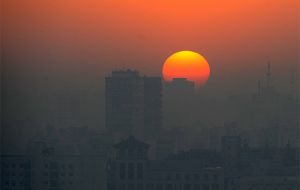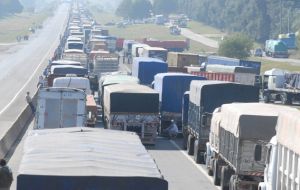MercoPress. South Atlantic News Agency
Scrub fires smoke covers Buenos Aires and Montevideo
 Bs. Aires City under the smoke
Bs. Aires City under the smoke  Highway 9 in northern Buenos Aires close
Highway 9 in northern Buenos Aires close  Smoke spread along the coast to Montevideo and even further east to Punta del Este.
Smoke spread along the coast to Montevideo and even further east to Punta del Este. Argentine government and farmers caught up in a month-long confrontation over an export tax increase, clashed again Thursday because of the extensive burning of grasslands that has thrown a blanket of smoke over the capital Buenos Aires and has even reached parts of neighboring Uruguay.
Argentine president Cristina Fernandez de Kirchner described farmers blamed for the fires as "irresponsible". Mrs. Kirchner made her remarks after flying over the fire zone by helicopter. Smoke from the fires in an estimated area of 70.000 hectares have disrupted port, air and road travel with thousands of Buenos Aires residents complaining of breathing difficulties and sore eyes and with the smell of burning spreading all along. The fires which began around 300 kilometers north of Buenos Aires and to the south of the neighboring province of Entre Rios are intended to clear grasslands and scrub, helping growth of new pastures for livestock. But apparently fires are out of control. Argentine Interior Minister Florencio Randazzo said more than 300 fires had been detected. Cattle farmers were "paying no attention to the consequences, just focusing on maximizing profits" he claimed in an interview on national television. "We are facing a disaster caused by the hand of man," he said, warning farmers faced prosecution. But the Federación Agraria Argentina, the association that groups small and medium farmers, immediately complained about the "political overtones" of the accusation. "The government wants to draw attention away from the central issues in the debate," said the vice president of the Federación, Ulises Forte, who admitted that the fire may have begun when a farmer set fire to a small pasture and it got out of control "due to poor management." "This form of clearing weeds and generating environmental chaos must be investigated," said cabinet chief Alberto Fernández. Around a week ago, a haze had already been seen for several days in Buenos Aires, but the authorities had been unable to pinpoint the source. However, the burning smell returned on Tuesday, and the cause was identified. The low visibility caused by the smoke has brought about several fatal traffic accidents over the last week or so. On April 9, 11 crashes along a 35-km stretch of highway 9 in northern Buenos Aires left four people dead. And on April 16, three people were killed in an accident on the same road. A dozen highways in the northeastern part of the country were shut down, several long-distance bus routes were suspended, and a number of flights were cancelled. Meantime Uruguay woke on Thursday to a haze of smoke, but no burning smell, that spread along the coast to Montevideo and even further east to Punta del Este. Some air flights were delayed and visibility in some Uruguayan routes was down to 800 meters. Agronomist Raúl Brasesco, head of the Experimental Agency of the National Institute of Agricultural Technology (INTA) in Entre Ríos province said fires could be the result of a combination of factors like drought, high winds, abundant grass and the smaller than usual number of cattle. "There is a major drought in the area, and a thick layer of grass formed, that was not grazed because there were fewer head of cattle, and the high grass is highly flammable," he said. Weather forecasters interviewed on television said that fires could be easily contained with rainfall, but there are no prospects of precipitations for the next few days.




Top Comments
Disclaimer & comment rulesCommenting for this story is now closed.
If you have a Facebook account, become a fan and comment on our Facebook Page!